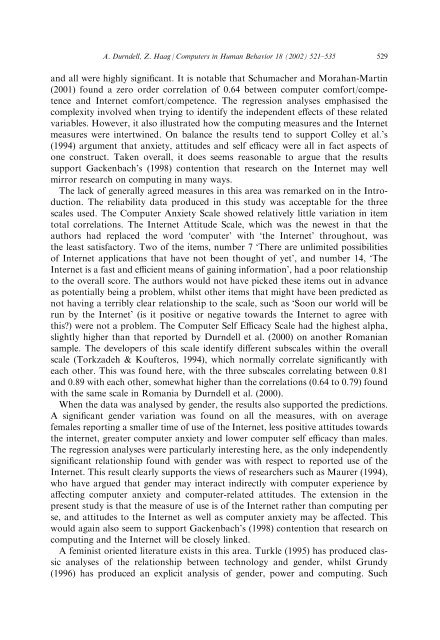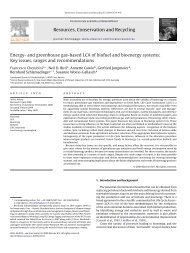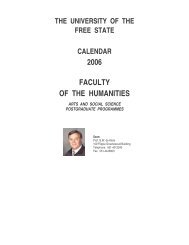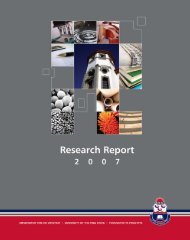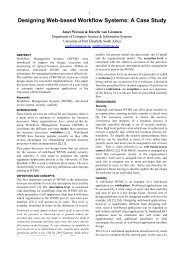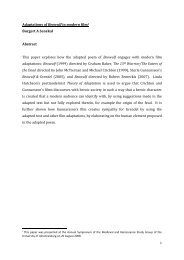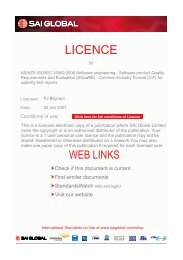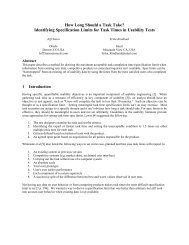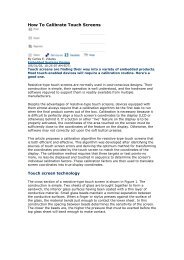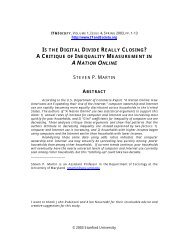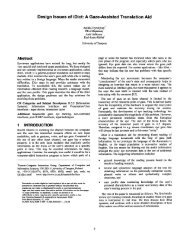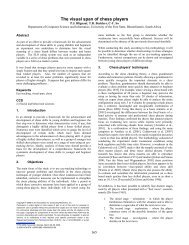Computer self efficacy, computer anxiety, attitudes towards the ...
Computer self efficacy, computer anxiety, attitudes towards the ...
Computer self efficacy, computer anxiety, attitudes towards the ...
Create successful ePaper yourself
Turn your PDF publications into a flip-book with our unique Google optimized e-Paper software.
A. Durndell, Z. Haag / <strong>Computer</strong>s in Human Behavior 18 (2002) 521–535 529and all were highly significant. It is notable that Schumacher and Morahan-Martin(2001) found a zero order correlation of 0.64 between <strong>computer</strong> comfort/competenceand Internet comfort/competence. The regression analyses emphasised <strong>the</strong>complexity involved when trying to identify <strong>the</strong> independent effects of <strong>the</strong>se relatedvariables. However, it also illustrated how <strong>the</strong> computing measures and <strong>the</strong> Internetmeasures were intertwined. On balance <strong>the</strong> results tend to support Colley et al.’s(1994) argument that <strong>anxiety</strong>, <strong>attitudes</strong> and <strong>self</strong> <strong>efficacy</strong> were all in fact aspects ofone construct. Taken overall, it does seems reasonable to argue that <strong>the</strong> resultssupport Gackenbach’s (1998) contention that research on <strong>the</strong> Internet may wellmirror research on computing in many ways.The lack of generally agreed measures in this area was remarked on in <strong>the</strong> Introduction.The reliability data produced in this study was acceptable for <strong>the</strong> threescales used. The <strong>Computer</strong> Anxiety Scale showed relatively little variation in itemtotal correlations. The Internet Attitude Scale, which was <strong>the</strong> newest in that <strong>the</strong>authors had replaced <strong>the</strong> word ‘<strong>computer</strong>’ with ‘<strong>the</strong> Internet’ throughout, was<strong>the</strong> least satisfactory. Two of <strong>the</strong> items, number 7 ‘There are unlimited possibilitiesof Internet applications that have not been thought of yet’, and number 14, ‘TheInternet is a fast and efficient means of gaining information’, had a poor relationshipto <strong>the</strong> overall score. The authors would not have picked <strong>the</strong>se items out in advanceas potentially being a problem, whilst o<strong>the</strong>r items that might have been predicted asnot having a terribly clear relationship to <strong>the</strong> scale, such as ‘Soon our world will berun by <strong>the</strong> Internet’ (is it positive or negative <strong>towards</strong> <strong>the</strong> Internet to agree withthis?) were not a problem. The <strong>Computer</strong> Self Efficacy Scale had <strong>the</strong> highest alpha,slightly higher than that reported by Durndell et al. (2000) on ano<strong>the</strong>r Romaniansample. The developers of this scale identify different subscales within <strong>the</strong> overallscale (Torkzadeh & Koufteros, 1994), which normally correlate significantly wi<strong>the</strong>ach o<strong>the</strong>r. This was found here, with <strong>the</strong> three subscales correlating between 0.81and 0.89 with each o<strong>the</strong>r, somewhat higher than <strong>the</strong> correlations (0.64 to 0.79) foundwith <strong>the</strong> same scale in Romania by Durndell et al. (2000).When <strong>the</strong> data was analysed by gender, <strong>the</strong> results also supported <strong>the</strong> predictions.A significant gender variation was found on all <strong>the</strong> measures, with on averagefemales reporting a smaller time of use of <strong>the</strong> Internet, less positive <strong>attitudes</strong> <strong>towards</strong><strong>the</strong> internet, greater <strong>computer</strong> <strong>anxiety</strong> and lower <strong>computer</strong> <strong>self</strong> <strong>efficacy</strong> than males.The regression analyses were particularly interesting here, as <strong>the</strong> only independentlysignificant relationship found with gender was with respect to reported use of <strong>the</strong>Internet. This result clearly supports <strong>the</strong> views of researchers such as Maurer (1994),who have argued that gender may interact indirectly with <strong>computer</strong> experience byaffecting <strong>computer</strong> <strong>anxiety</strong> and <strong>computer</strong>-related <strong>attitudes</strong>. The extension in <strong>the</strong>present study is that <strong>the</strong> measure of use is of <strong>the</strong> Internet ra<strong>the</strong>r than computing perse, and <strong>attitudes</strong> to <strong>the</strong> Internet as well as <strong>computer</strong> <strong>anxiety</strong> may be affected. Thiswould again also seem to support Gackenbach’s (1998) contention that research oncomputing and <strong>the</strong> Internet will be closely linked.A feminist oriented literature exists in this area. Turkle (1995) has produced classicanalyses of <strong>the</strong> relationship between technology and gender, whilst Grundy(1996) has produced an explicit analysis of gender, power and computing. Such


